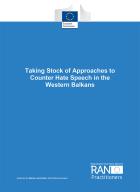Details
- Publication date
- 2 October 2023
- Author
- Directorate-General for Migration and Home Affairs
- RAN Publications Topic
- Alternative and counter narratives
- Counter- and alternative narratives
- Social cohesion and polarisation
Description
In recent years, the prevalence of hate speech has become an increasing concern across European societies because of its damaging effect on the very foundation of society and trust between communities.
Experts and practitioners have offered a variety of hate speech definitions. For the purpose of this paper, we will use the definition from the Recommendation of the European Commission against Racism and Intolerance (ECRI) of the Council of Europe that defined hate speech as:
“advocacy, promotion or incitement, in any form, of the denigration, hatred or vilification of a person or group of persons, as well as any harassment, insult, negative stereotyping, stigmatization or threat in respect of such a person or group of persons and the justification of all the preceding types of expression, on the ground of ‘race’, colour, descent, national or ethnic origin, age, disability, language, religion or belief, sex, gender, gender identity, sexual orientation and other personal characteristics or status”.
In the Western Balkans (WBs), hateful narratives are particularly dangerous because of their substantial potential to increase the existing tensions between communities and negatively affect the trust building process as well as genuine recovery of the whole society from the past conflicts. The manifestation of hate speech is evident in all areas of WB reality. Hate messages may be found on the web, in media and cultural manifestations, and in urban and rural, ethnically homogeneous and heterogeneous environments.
The legacy of the wars in the 1990s, the lack of consensus on the narratives of the past, the existing fragmentation of the society, the dominance of collective identities, significant economic problems, various foreign influences, strong patriarchal norms, and the media propagating intolerance (and hatred) on a daily basis all contribute to the acceptance of hateful narratives and hate speech as ‘normal’ in the WB society. This normalisation of hate speech consequently contributes to the WBs being a breeding ground for radicalisation leading to violent extremism, since the usage of hate speech is a frequent starting point for radicalisation. It is used by radical groups and fringe ones as the main generator of the social climate of intolerance and prejudice that appears as a general psychological framework for the expansion of all forms of acts of hatred from physical violence to verbal and psychological abuse.

